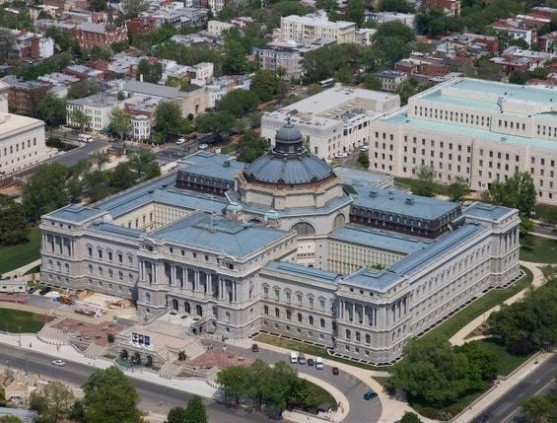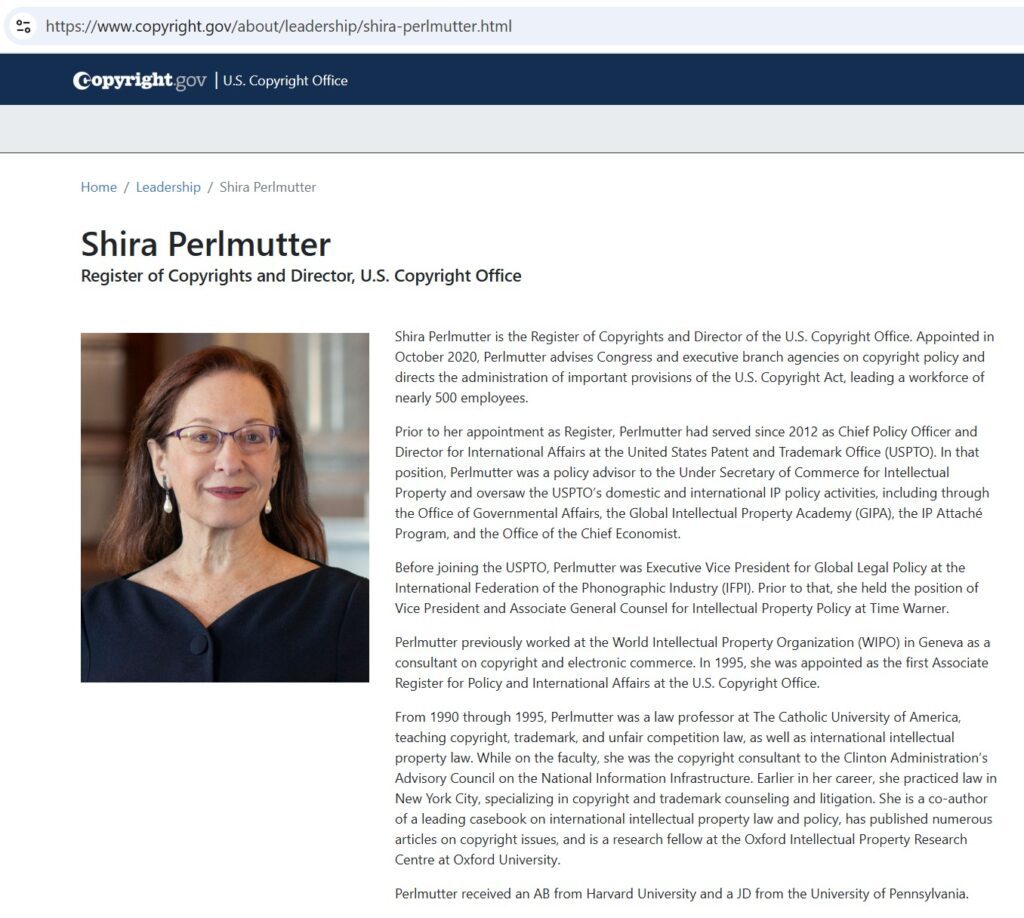We live in challenging times, surrounded by truly terrible world events. It would seem, in this context, that who’s heading up the U.S. Copyright Office is not really a very compelling question. However, for authors looking to protect their works from theft (whether by unscrupulous people or copyright-blind AI web-crawlers), it’s a pretty weighty issue. Here, I’ll try to shed some light on the chaos going on at the moment in the Copyright Office, and consider how (or if) it matters to content-creators. (Hint: the author of Copyright for Creatives thinks it probably does.)
A Quick Overview of the Copyright Office
In the United States, copyrights are registered with the US Copyright Office, located in the Library of Congress in Washington, D.C. The Office was established in 1790, and has been part of the Library of Congress since 1870.[1] Since its founding, the Copyright Office has registered more than 33,654,000 copyrights.[2] In a single year, the Copyright Office registers more than 400,000 copyrights, collects over $30 million in registration fees, and forwards more than half a million works, representing a value of over $45 million, for archiving in the Library of Congress.[3]

The Register of Copyrights is appointed to a 10-year term by the Librarian of Congress, and heads up an office of around 440 people.[4] (In 2017, under the first Trump administration, legislation was introduced to make the Register of Copyrights a direct presidential appointment, but the bill failed to pass.) The current Register of Copyrights is Shira Perlmutter, who was appointed in October 2020 for a 10-year term, which will expire in 2030.[5]
Registration
Copyright exists just by the act of you creating a copyrightable work.[6] You don’t have to mail things to yourself, you don’t have to do a special dance in the moonlight, you don’t need to do anything: you created a copyrightable work, you have a copyright. What you don’t have, though, is a work that’s protected by the law, and the right to sue an infringer in court and collect statutory damages. The only way to get that is to register your copyright.
With an unregistered copyright, you can send cease and desist letters and hire a lawyer to send threatening memos to the infringer, but that’s about it. Title 17 U.S.C. §411(a) says “no civil action for infringement of the copyright in any United States work shall be instituted until preregistration or registration of the copyright claim has been made in accordance with this title.”[7] That means a copyright holder can’t sue an infringer unless the copyright is registered, or at least until the work has been submitted to the Copyright Office for registration. However, in 2019 the U.S. Supreme Court unanimously held that although the creator of a work holds the full bundle of copyright sticks from the moment a work is created, the creator can’t file a lawsuit for infringement until after their copyright registration application has been approved by the Copyright Office.[8i]
So there’s a good reason to register. A certificate of registration creates a public record of key facts relating to the authorship and ownership of the work, including title of the work; author; name and address of the copyright owner; year of creation; and other facts about the work and its creation. (The fancy lawyer way of saying this is that registration is prima facie evidence of your copyright’s validity.)
Anyway, that’s basically why the Copyright Office is important: it safeguards creators’ work and assures their ability to recover damages from infringers.
Leadership Ping-Pong
Which brings us to the current situation at the Copyright Office.
As I just mentioned, the current Register of Copyrights is Shira Perlmutter. Ms Perlmutter is an attorney and law professor with an extensive and impressive background in intellectual property law in both government and the private sector. You know that Shira Perlmutter is the Register of Copyrights, because the official government site for the Copyright Office clearly says so on its “Leadership” page:[9]

Except she’s not, because the Trump administration fired her in May of this year.[10] First, though, the administration fired the Librarian of Congress.[11] President Trump then immediately appointed Todd Blanche as acting Librarian of Congress. Blanche has no experience working with libraries or archives, but did act as Trump’s personal attorney in the then-former president’s 2024 criminal conviction.[12] Mr. Blanche appointed a new Register of Copyrights, Paul Perkins, until then an attorney with the Department of Justice with a focus on fraud and false claims.[13]
Except she is, because her firing may have been illegal. Shortly after being notified of her firing (by email), Perlmutter filed a wrongful discharge lawsuit against Blanche, Perkins, and others in the administration, alleging that “the Administration’s attempts to remove Ms. Perlmutter as the Register of Copyrights are blatantly unlawful. Congress vested the Librarian of Congress—not the President—with the power to appoint, and therefore to remove, the Register of Copyrights. (17 U.S.C. § 701(a)). Accordingly, the President’s attempt to remove Ms. Perlmutter was unlawful and ineffective.”[14] The lawsuit argued that while the Librarian of Congress was nominated by the President, the nominee had to be confirmed by the Senate, and could only be removed by Congress. And since the Librarian of Congress is solely empowered to appoint the Register of Copyrights, the executive branch does not have the authority to arbitrarily fire or fill either position.[15]
Lawyers for the administration argued that the firings were legal under the Federal Vacancies Reform Act, which allows the President to fill certain vacancies—presumably even ones the President has created.[16] White House Press Secretary Karoline Leavitt justified Hayden’s firing based on allegations that the Librarian of Congress had taken actions “in the pursuit of D.E.I. and putting inappropriate books in the library for children.”[17] Perlmutter’s lawsuit argued that her own firing occurred one day after she released a report on AI and copyright that concluded that some uses of copyrighted works in generative AI training were likely to qualify as “fair use,” but some uses were likely to require licensing[18]—a position that conflicted with the administration’s strongly pro-AI view.
Except she’s not, because her motions for an emergency injunction and temporary restraining order leaving her in the Register’s position pending a decision in the case were rejected by the D.C. District Court.[19]
Except she is, because on September 10 the U.S. Court of Appeals for D.C. reversed the District Court and returned Perlmutter to office pending the outcome of the case.[20] Among its holdings, the court noted that the 17 U.S.C. § 701(a) clearly empowers the Librarian of Congress—not the President—to appoint the Register. And because the statute gives no direction on the question of firing, it is legally assumed that the Librarian—not the President—also has the power to remove the Register.[21]
Except… Of course, the administration will likely appeal the granting of an injunction, and we have yet to hear from the trial court or U.S. Supreme Court on the particular question of executive branch authority to hire and fire the Librarian of Congress and, by extension, the Register of Copyrights. Given the Supreme Court’s recent tendency to recognize fairly expansive executive power…well, we’ll see.
In the meantime, while all this has been going on, things have been a little confused at the Copyright Office, as you might expect. In response to the confusion when Perkins was announced as the new Register, the Copyright Office suspended issuing any new registrations for two weeks, delaying about 20,000 submissions. Since then, copyright registration certificates have started to be issued again, only now they’re issued without the signature of the Register of Copyrights, whoever that may be.[22]
While there’s no clear legal requirement that a copyright certificate must be signed by the Register in order to be valid, it’s conceivable the absence of a signature could adversely affect the legal validity of a creator’s copyright. Section 410(a) of the Copyright Act mandates that
[w]hen, after examination, the Register of Copyrights determines that, in accordance with the provisions of this title, the material deposited constitutes copyrightable subject matter and that the other legal and formal requirements of this title have been met, the Register shall register the claim and issue to the applicant a certificate of registration under the seal of the Copyright Office.
Note that there is no explicit requirement in the statutory language that a signature is required for a certificate to be valid. However, there could conceivably be challenges to the validity of a work’s copyright if the certificate isn’t signed, since the signature is taken as confirming that the Registrar has performed their statutorily-required review and determination.[23]

For now, though, holders of recent copyrights should probably not be too worried: it’s highly likely that most courts will continue to recognize the unsigned registrations as valid for the purpose of proceeding with an infringement lawsuit. After all, the unsigned certificates still have a registration number and the seal of the Copyright Office. But it’s also possible that a legal challenge to such a copyright could be raised, and potentially upheld. In any case, copyright holders should certainly remain alert to developments in the ongoing shenanigans at the Copyright Office.
[1] US Copyright Office, “Overview” https://www.copyright.gov/about/
[2] Id.
[3] US Copyright Office, “Overview” https://www.copyright.gov/about/small-claims/
[4] https://www.copyright.gov/help/faq/faq-general.html
[5] Id.
[6] Id.
[7] Title 17 USC §411(a). https://www.law.cornell.edu/uscode/text/17/4
[8] Fourth Estate Public Benefit Corp. v Wall-Street.com, LLC, 139 S.Ct. 881 (2019)
[9] https://www.copyright.gov/about/leadership/shira-perlmutter.html
[10] https://www.npr.org/2025/05/23/nx-s1-5408982/register-of-copyrights-lawsuit-trump
[11]Dr. Carla Hayden, the first woman and first African-American to be named Librarian of Congress. Dr. Hayden appointed Perlmutter to head the Copyright Office in 2020. Id.
[12]People of the State of New York v. Donald J. Trump, https://apnews.com/article/trump-trial-deliberations-jury-testimony-verdict-85558c6d08efb434d05b694364470aa0.
[13] https://hcca.digitellinc.com/b/sp/paul-perkins-1666
[14] Perlmutter v. Blanch, No. 25-5285, _ F.4th_ (D.C. Cir. Sept. 10, 2025); https://storage.courtlistener.com/recap/ gov.uscourts.dcd.280893/gov.uscourts.dcd.280893.1.0.pdf
[15] https://www.npr.org/2025/06/06/nx-s1-5399781/copyright-office-explainer-perlmutter-trump
[16] Green, Erica, “Trump Fired Librarian of Congress Over D.E.I.,” N.Y. Times (May 9, 2025), https://perma.cc/B434-H5QP.
[17] Perlmutter v. Blanch, No. 25-5285, _ F.4th_ (D.C. Cir. Sept. 10, 2025), supra.
[18] https://levin-center.org/congressional-lawmakers/congressional-oversight-resources/oversight-case-law/perlmutter-blanche/
[19] https://media.cadc.uscourts.gov/orders/docs/2025/09/25-5285LDSN2.pdf
[20] https://www.npr.org/2025/06/06/nx-s1-5399781/copyright-office-explainer-perlmutter-trump
[21] https://media.cadc.uscourts.gov/orders/docs/2025/09/25-5285LDSN2.pdf
[22] https://www.wired.com/story/us-copyright-office-chaos-doge/
[23] The Copyright Act, 17 USC §410(a)